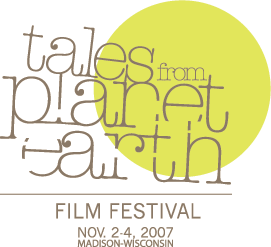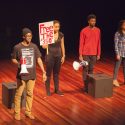Festival to showcase environmental films in November
From travelogue-expedition films to the experimental avant-garde and the worlds of Walt Disney and Jacques Cousteau, cinema has been central to how we think about nature and the environment.
Environmental films can bring in big audiences, too. Who could have imagined that documentaries about global warming and penguins on the move would capture the consciousness and hearts of millions?
Some films show the natural world in desperate disrepair, but if there is hope for the future, it rests on action – and much of that action can be sparked by good storytelling, says Gregg Mitman, organizer of Tales from Planet Earth, a three-day environmental film festival to take place in Madison Friday-Sunday, Nov. 2-4.
"The response to ‘An Inconvenient Truth’ had less to do with Al Gore’s slide lecture and more to do with the ways in which the slide presentation was woven into his own personal and family story," says Mitman, William Coleman Professor of History of Science and professor of medical history and science and technology studies. "The decision by Gore’s father to quit tobacco farming, for example, after his daughter died of lung cancer had a deeply moving effect on audiences that brought an emotional dimension to what in the hands of another filmmaker might be a very dry subject."
Tales from Planet Earth will present more than 20 films from around the world, ranging from Uncle Walt’s 1942 animated blockbuster "Bambi" to "Bhopal Express," which sets a love story against the backdrop of the 1984 poisonous gas leak in India that killed 8,000 people.
The festival kicks off with a "Humanities without Boundaries" lecture by Bill McKibben titled "The Nature of Hope." McKibben, dubbed the poet laureate of global warming, literally wrote the book on the issue when he published "The End of Nature" in 1987. His lecture is at 6:30 p.m. on Friday, Nov. 2, at the Orpheum Theatre.
The lecture will be followed by the Madison premiere of "Everything’s Cool," a hot new documentary about global warming. It is a comedic, character-driven, behind-the-scenes look at the hottest environmental problem of our time. "Everything’s Cool" will be followed by a post-show discussion with McKibben and the film’s directors, Daniel Gold and Judith Helfand.
Other films to be featured at the festival include "Flock of Dodos" (2006), the first documentary to present both sides of the intelligent design/evolution clash; and "Manufactured Landscapes" (2006), which captures the world and work of renowned photographer Edward Burtynsky as he travels across China, photographing the evidence and effects of the country’s massive industrial revolution.
Screenings of several new documentaries by award-winning directors will be among the festival’s highlights, as well as a presentation by New Zealand filmmaker and penguin biologist Lloyd Spencer Davis about the history of penguins in movies.
Admission to all festival events is free and open to the public on a first-come, first-served basis. The festival will take place in three venues: the Orpheum Theatre, 216 State St.; the Madison Museum of Contemporary Art (MMOCA), 227 State St.; and UW Cinematheque, 4070 Vilas Hall, 821 University Ave.
The Nelson Institute for Environmental Studies’ new Center for Culture, History, and Environment is hosting the festival with support from more than 20 campus and community co-sponsors.
Tags: arts, environment, events, film, international


